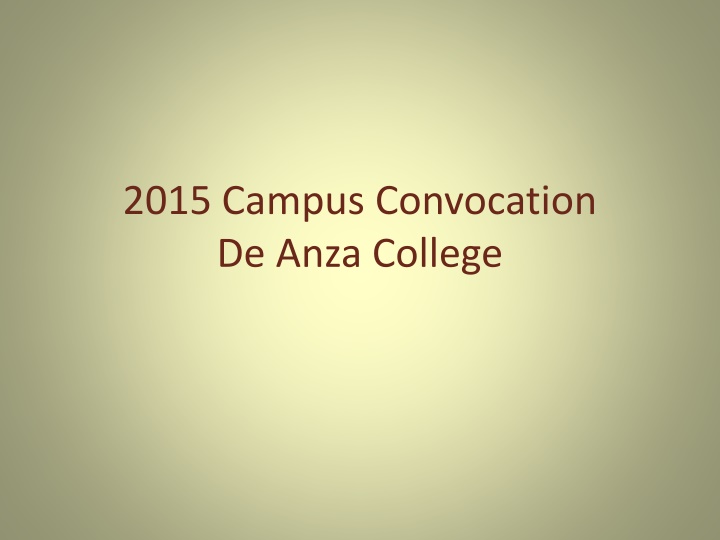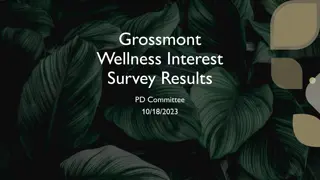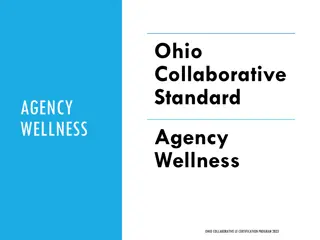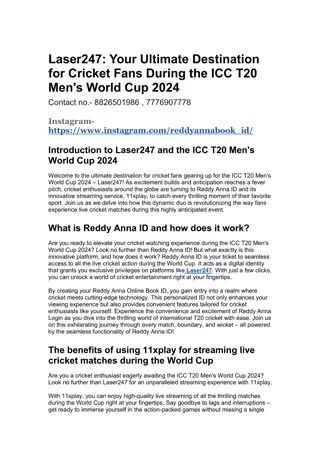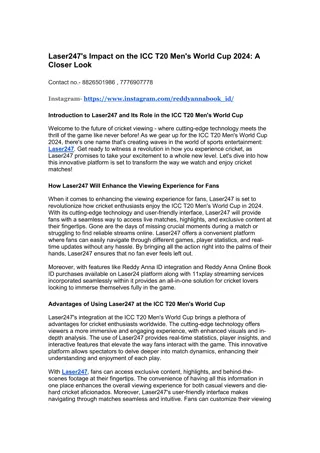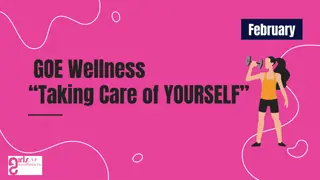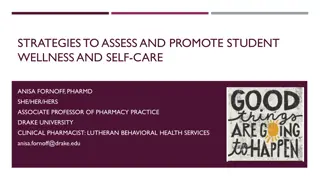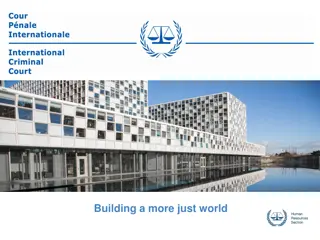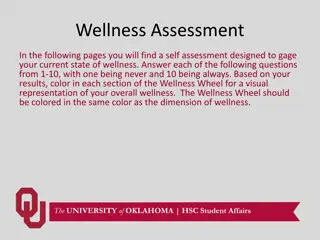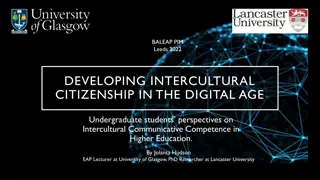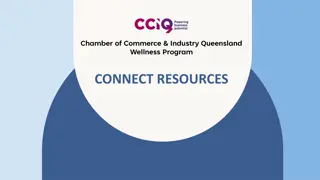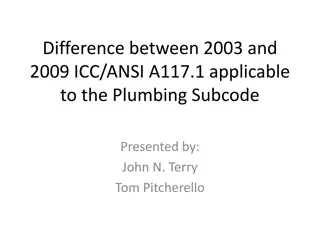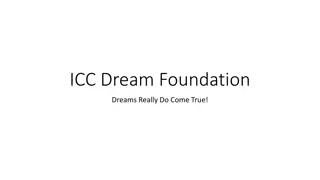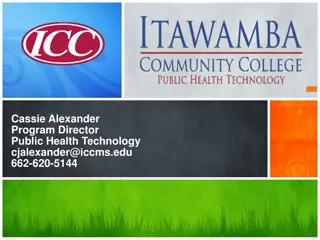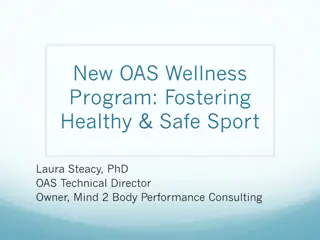ICC Assessment for Physical/Mental Wellness at De Anza College
The ICC assessment at De Anza College focuses on promoting physical and mental well-being, self-reflection, ethical decision-making, exploring career choices, and demonstrating a commitment to ongoing learning. Innovative assessment work includes programs such as the Tobacco Cessation Program and Chill City, which offer personalized support for students. Through individual counseling sessions and behavior change strategies, students are empowered to make positive lifestyle choices.
Download Presentation

Please find below an Image/Link to download the presentation.
The content on the website is provided AS IS for your information and personal use only. It may not be sold, licensed, or shared on other websites without obtaining consent from the author.If you encounter any issues during the download, it is possible that the publisher has removed the file from their server.
You are allowed to download the files provided on this website for personal or commercial use, subject to the condition that they are used lawfully. All files are the property of their respective owners.
The content on the website is provided AS IS for your information and personal use only. It may not be sold, licensed, or shared on other websites without obtaining consent from the author.
E N D
Presentation Transcript
2015 Campus Convocation De Anza College
Convocation Schedule 9:00-10:30 Morning Program An overview of assessing the Physical/Mental Wellness and Personal Responsibility ICC 10:40-11:25 Breakout Session I 11:30-12:15 Breakout Session II 12:20-1:10 Lunch (with special guests!) 1:10-3:00 Dept/Program Assessment Work Afternoon ask : SLO Assessment Plan (due 4/20)
ICC Assessment at De Anza College Communication and Expression Information Literacy Civic Capacity for Global, Cultural, Social and Environmental Justice Addressed during 2013 and 2014 Convocations Critical Thinking Addressed during 2012 Convocation Physical/Mental Wellness and Personal Responsibility
ICC Assessment: Physical/Mental Wellness and Personal Responsibility Students will recognize lifestyles that promote physical and mental well-being, engage in self-reflection and ethical decision- making, explore career choices and life goals, practice effective individual and collaborative work habits, and demonstrate a commitment to ongoing learning.
ICC Assessment: Physical/Mental Wellness and Personal Responsibility Five examples of innovative assessment work: The Tobacco Cessation Program (Health Services) Chill City (Health Services) The Food Pantry (Occupational Training Institute) PLO assessment for Physical Education department Psychological Services
ICC Assessment: Physical/Mental Wellness and Personal Responsibility Example #1: The Tobacco Cessation Program Health Education and Wellness Tobacco Cessation Program offers students individualized counseling and support while they quit using tobacco products. This program is student driven. Students work with a trained counselor to identify their tobacco trigger-response systems, develop coping skills and alternate behaviors with the goal of becoming tobacco-free through behavior change.
ICC Assessment: Physical/Mental Wellness and Personal Responsibility Example #1: The Tobacco Cessation Program Services Include: 1:1 counseling sessions that include education, advice, support, and encouragement for each student. Free nicotine patches and gum according to the individual student s needs. Tips, tricks, and other resources for making quitting successful. Quit kits: A collection of items used by students when they feel the need to use tobacco.
ICC Assessment: Physical/Mental Wellness and Personal Responsibility Example #1: The Tobacco Cessation Program Data from a three year-assessment: 2011/12: Recruited students from smoking areas on campus 36 enrolled, 4% success rate 2012/13: More active recruitment practices 47 enrolled, few completed the program 2013/14: Informed students of service, rather than active recruitment: 30 enrolled, 17% successfully completed
ICC Assessment: Physical/Mental Wellness and Personal Responsibility Example #1: The Tobacco Cessation Program Evidence-based program enhancement: We will continue to exercise our new recruiting strategies in the coming school years in hopes of sustaining growth. Practice changes are anticipated as guidelines and best practices are identified. Always, our goal is to engage and encourage more DeAnza students to become tobacco-free.
ICC Assessment: Physical/Mental Wellness and Personal Responsibility Example #2: Chill City One of several quarterly events facilitated by Health Services
ICC Assessment: Physical/Mental Wellness and Personal Responsibility Example #2: Chill City One of several quarterly events facilitated by Health Services
ICC Assessment: Physical/Mental Wellness and Personal Responsibility Example #2: Chill City One of several quarterly events facilitated by Health Services
ICC Assessment: Physical/Mental Wellness and Personal Responsibility Example #2: Chill City One of several quarterly events facilitated by Health Services
ICC Assessment: Physical/Mental Wellness and Personal Responsibility Example #2: Chill City Get your chill on while you de-stress before finals. Special guests will help keep your stress levels in check to enable you to study for finals. Held in the S-Quad the week before finals.
ICC Assessment: Physical/Mental Wellness and Personal Responsibility Example #2: Chill City An assessment challenge: Survey-based assessment would seem to interfere with the aims of the event itself The idea is to decrease stress, after all
ICC Assessment: Physical/Mental Wellness and Personal Responsibility Example #2: Chill City An assessment solution: Anecdotal evidence can be valuable, too!
ICC Assessment: Physical/Mental Wellness and Personal Responsibility Example #3: The Food Pantry (OTI) Sometimes asking the right questions can result in a profound impact on our students lives
ICC Assessment: Physical/Mental Wellness and Personal Responsibility Example #3: The Food Pantry (OTI) From Veronica Acevedo Avila s January 2014 article in the SLO Newsletter: As much as Dan and the OTI staff would like to think that all affiliated students know about every service they offer, they knew this wasn t the case. So his team conducted a survey to find out which OTI services students knew versus which ones they needed to better advertise.
ICC Assessment: Physical/Mental Wellness and Personal Responsibility Example #3: The Food Pantry (OTI) From Veronica Acevedo Avila s January 2014 article in the SLO Newsletter: The SSLO assessment survey results showed that the majority of students didn t know about food and shelter services. But more importantly, the team found out the true extent to which this service was needed because students reported that they were coming to class hungry.
ICC Assessment: Physical/Mental Wellness and Personal Responsibility Example #3: The Food Pantry (OTI) From Veronica Acevedo Avila s January 2014 article in the SLO Newsletter: These individuals didn t have the money to buy food for themselves nor their families. The SSLO assessment survey results helped identify food insecurity issues amongst students and OTI took action.
ICC Assessment: Physical/Mental Wellness and Personal Responsibility Example #4: PLO Assessment for the P.E. Program The assessment of this ICC is often directly embedded into the assessment work that we already do for our course and program level outcomes
ICC Assessment: Physical/Mental Wellness and Personal Responsibility Example #4: PLO Assessment for the P.E. Program
ICC Assessment: Physical/Mental Wellness and Personal Responsibility Example #4: PLO Assessment for the P.E. Program PLO Statement: Demonstrate the knowledge, skills and ability to understand and use core fitness concepts in the pursuit of life long health and wellness. Assessment method: 6 questions embedded in a survey. Give instructors a survey with scantrons and they choose a class to perform the survey in.
ICC Assessment: Physical/Mental Wellness and Personal Responsibility Example #4: PLO Assessment for the P.E. Program 66% of students were able to discern and employ fitness concepts. Target met relative to institutional equity standards. But, may not have been met relative to the SLO standards set when the SLO statement was created.
ICC Assessment: Physical/Mental Wellness and Personal Responsibility Example #5: Psychological Services This program more directly emphasizes the mental wellness addressed by the ICC language. A relatively new program, Psychological Services was first introduced in the winter of 2014.
ICC Assessment: Physical/Mental Wellness and Personal Responsibility Example #5: Psychological Services Siew Kuek, director of the PS program, brought her own assessment work from her previous field experience and education to bear in the development of the program itself.
ICC Assessment: Physical/Mental Wellness and Personal Responsibility Example #5: Psychological Services An innovative approach meets both aims simultaneously: By working with practicum students currently working toward state licensure, Siew is now able to also offer unlimited appointments with trained therapists to students who want them. Appointments beyond the initial limit of five now incur a nominal $10 charge per meeting for students less than the cost community clinics, and less than the cost of a standard co-payment.
ICC Assessment: Physical/Mental Wellness and Personal Responsibility Example #5: Psychological Services Siew is confident that the Outcome Measures that she is collecting this year will demonstrate that year-long student-clinician relationships greatly enhance the efficacy of the PS program.
ICC Assessment: Physical/Mental Wellness and Personal Responsibility The Bigger Picture These examples illustrate ways in which the college does seem to be meeting the aim of improving student health and wellness. But they also leave us with three questions: 1. Where else do we find examples of this kind of work? 2. How can we improve? 3. How are we meeting the aim of enhancing our students sense of responsibility?
ICC Assessment: Physical/Mental Wellness and Personal Responsibility Assessing Personal Responsibility : A Focus Group Our student panelists represent three programs that emphasize students sense of personal responsibility: From the LEAD (Latino/a Empowerment at De Anza) program: Nicholas Estrada Mia Hernandez Naresa Hussaini Stacey Ochoa
ICC Assessment: Physical/Mental Wellness and Personal Responsibility Assessing Personal Responsibility : A Focus Group Our student panelists represent three programs that emphasize students sense of personal responsibility: From the FYE (First Year Experience) program: Vanessa Mae Flanagan Kiyonna Simms
ICC Assessment: Physical/Mental Wellness and Personal Responsibility Assessing Personal Responsibility : A Focus Group Our student panelists represent three programs that emphasize students sense of personal responsibility: From the LINC (Learning in Communities) program: Emily Lovelace Cristina Maravilla
ICC Assessment: Physical/Mental Wellness and Personal Responsibility Assessing Personal Responsibility : A Focus Group As we listen to our students, consider the following questions: Are there ways in which these experiences remind you of practices that you employ in your work on campus? Are there ways in which you can integrate any of these practices in your work? Can you suggest ideas/practices for promoting students sense of personal responsibility that have not been discussed by our panelists?
ICC Assessment: Physical/Mental Wellness and Personal Responsibility Assessing Personal Responsibility : A Focus Group Having heard from our panelists, please discuss these questions at your table, and briefly record a few of your responses on the forms provided: Are there ways in which these experiences remind you of practices that you employ in your work on campus? Reflection Are there ways in which you can integrate any of these practices in your work? Enhancement Can you suggest ideas/practices for promoting students sense of personal responsibility that have not been discussed by our panelists? Enhancement
Convocation Schedule 9:00-10:30 Morning Program An overview of assessing the Physical/Mental Wellness and Personal Responsibility ICC 10:40-11:25 Breakout Session I 11:30-12:15 Breakout Session II 12:20-1:10 Lunch (with special guests!) 1:10-3:00 Dept/Program Assessment Work Afternoon ask : SLO Assessment Plan (due 4/20)
Convocation Schedule Workshop Sessions 10:40-11:25 Wellness and Responsibility Across Boundaries (Veronica Neal) AT 202 The Cup is Half Empty (To o Ramirez) AT 204 Harm Reduction at De Anza (Michele LeBleu-Burns) AT 311 Everything you wanted to know about writing an assessment with (or without) TracDat (Amy Leonard) AT 203 Department Chairs/Program Coordinators and the SLO Assessment Process (Mary Pape) AT 205
Convocation Schedule Workshop Sessions 11:30-12:15 Wellness and Responsibility Across Boundaries (Veronica Neal) AT 202 The Cup is Half Empty (To o Ramirez) AT 204 Harm Reduction at De Anza (Michele LeBleu-Burns) AT 311 Everything you wanted to know about writing an assessment with (or without) TracDat (Amy Leonard) AT 203 Department Chairs/Program Coordinators and the SLO Assessment Process (Mary Pape) AT 205
